WriterZen - Allintitle Keyword Research— How to Determine Keyword Competition at a Glance

If all it took to win battles were military forces, Sun Tzu, author of “The Art of War,” won’t be regarded as one of the world’s greatest military strategists.
But centuries after his demise, this Chinese general is still revered.
Why?
Because he knew going to war with brawns and no brains is a recipe for failure. Tzu’s best-seller captured how crucial it is to know your enemy, plan, and apply wit on the battlefield.
An evergreen portion of his book went:
“If you know the enemy and know yourself, you need not fear the result of a hundred battles. If you know yourself but not the enemy, for every victory gained you will also suffer a defeat. If you know neither the enemy nor yourself, you will succumb in every battle.”
These principles go beyond military battles. They also apply to other competitive sectors, including content marketing.
For instance, replace the word “enemy” with “competition” and re-read the quote above. Notice how it applies to you and other content managers trying to rank highest on Google?
In the world of SEO, the battle is for organic traffic.
And the watchword is:
Let the best content rank.
To win, you need quality content optimized for specific keywords.
But if you only focus on creating high-quality content without knowing your competitors and what it takes to outrank them, you’ll be fighting a lost battle.
Now the question is: How do you determine keyword competition?
Simply typing a keyword into Google’s search box won’t tell you how many competitors are directly vying for that keyword.
Neither will the search results your keyword research tool shows you.
Your best bet?
A Google search operator called Allintitle.
At a glance, it shows you how many websites are competing for a specific keyword by including it in their title tags.
Since you’re still here, we assume you’re bent on leveraging allintitle keyword research to arm yourself in your quest to rank higher.
If our assumption is correct, you’re in the right place.
This guide will walk you through everything about allintitle keyword research. Also, you’ll see how to determine a keyword’s allintitle and other insights using WriterZen, a simplified content workflow software.
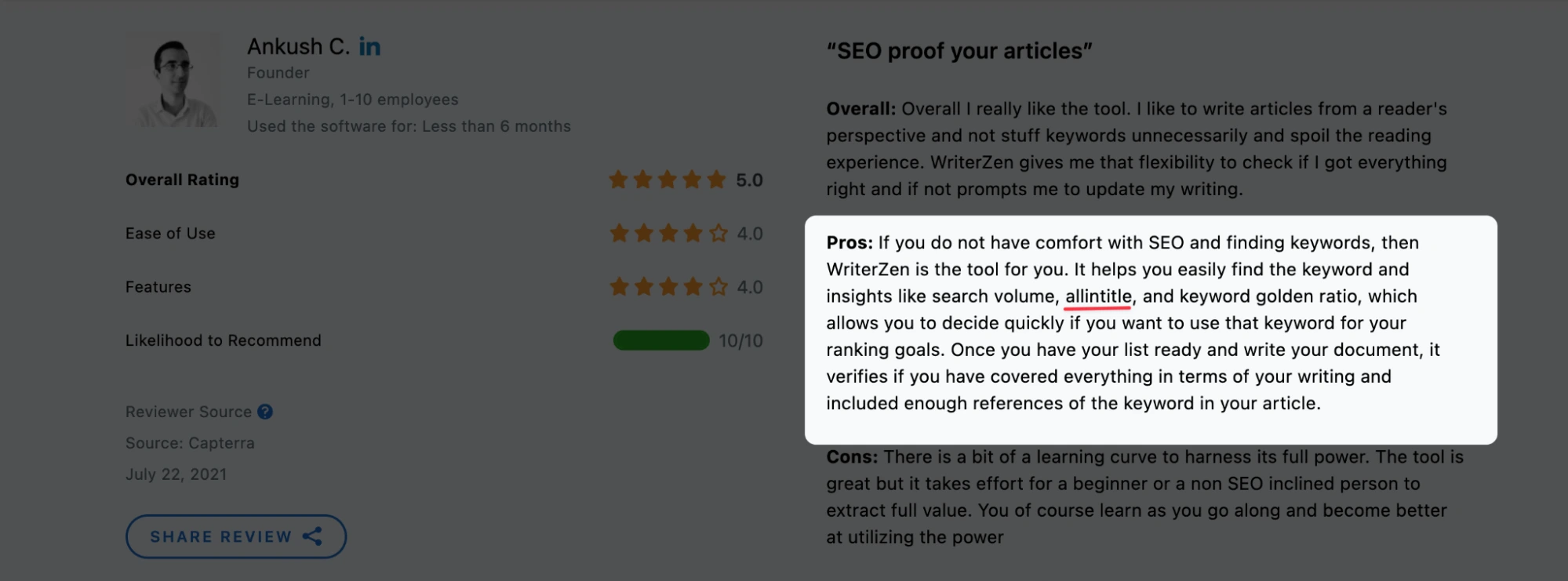
WriterZen review on Capterra
How Important Is Allintitle to Keyword Research?
When people search with the allintitle operator, Google shows results with the search query in their title tags.
“If you start your query with allintitle, Google restricts results to those containing all the query terms you specify in the title. For example, [ allintitle: detect plagiarism ] will return only documents that contain the words “detect” and “plagiarism” in the title.”
This operator helps when researching topics you plan to craft into articles.
When you use it to find competing articles, for instance, you can quickly dive in to note how they structure their content.
What’s more important?
This search operator helps you determine keyword competition — a necessary insight when choosing keywords for your SEO campaign. It indicates how many other articles you have to compete with to rank for a specific keyword because, as InMotion Hosting said:
“The more sites that use those keywords, the more difficult it will be to have page one ranking. Not impossible, but difficult.”
Due to this, allintitle helps in finding low-competition keywords, otherwise called golden keywords.
How?
The number of search results with the keyword phrase in the title is a crucial part of using the golden keywords’ formula (KGR). In other words, you can’t tell how competitive a keyword is without seeing the number of pages optimized for that keyword.
That’ll be taking a blind guess which doesn’t work in SEO.
To illustrate, a typical Google search returns results that have the search phrase anywhere on the webpage.
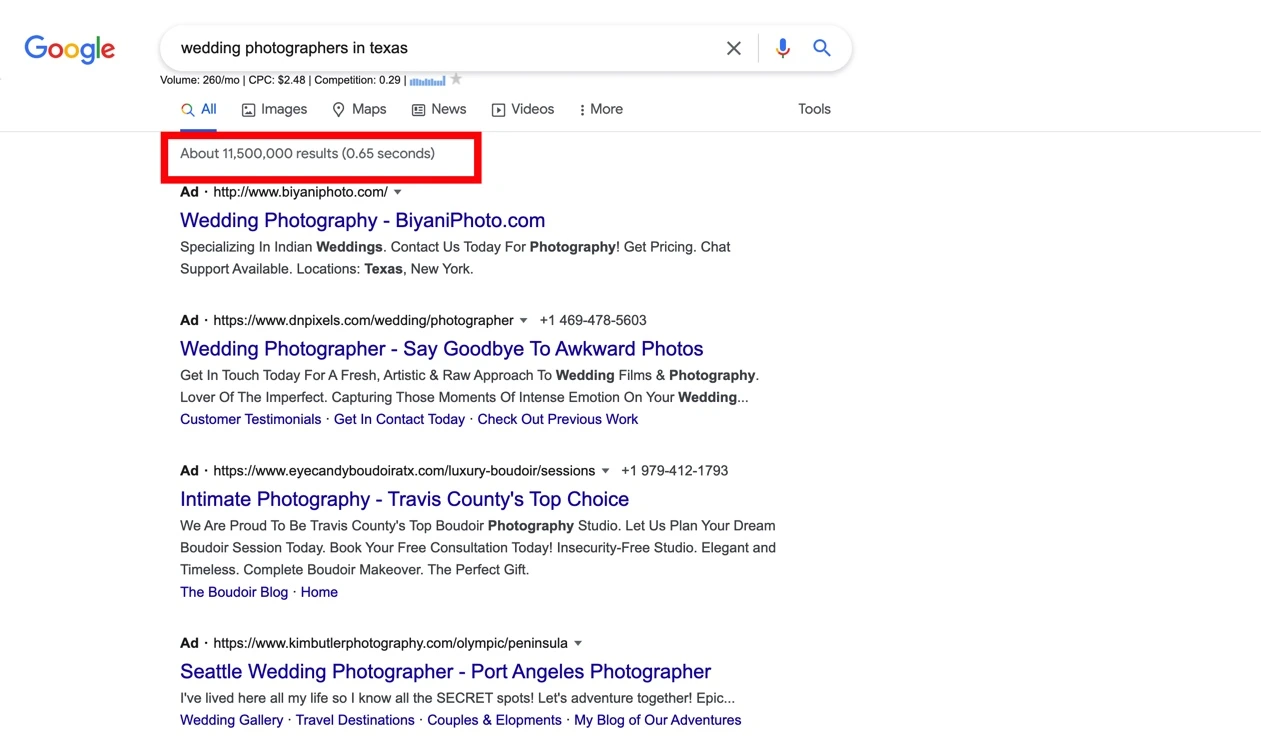
Over 11.5 million results in this case
But the allintitle index only returns content optimized for that search query in their title tags:
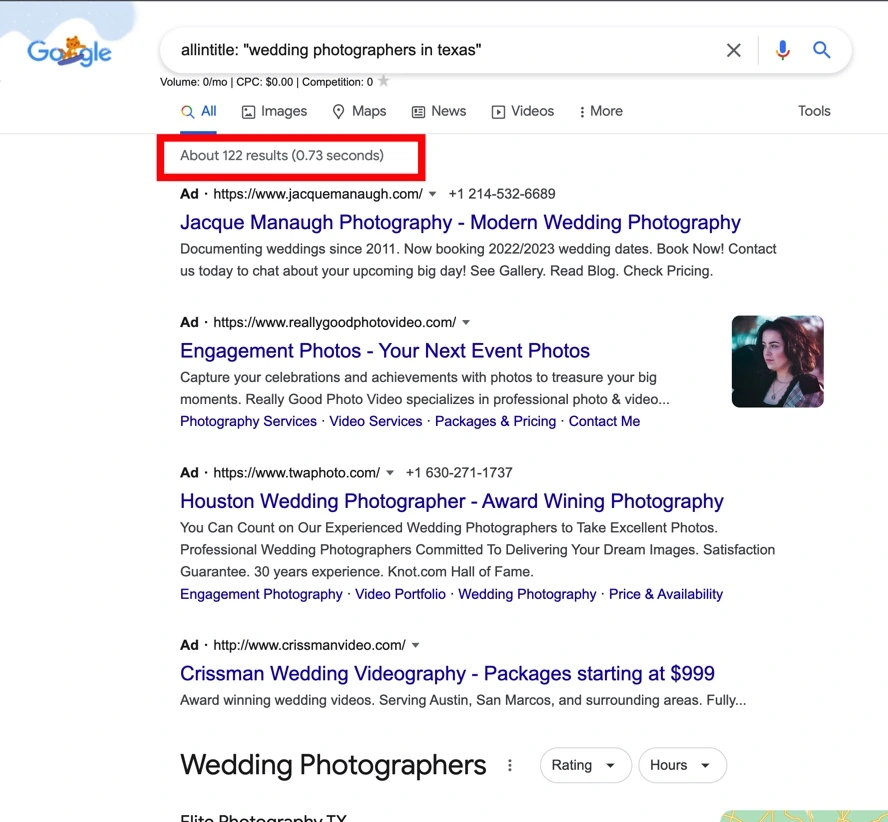
Just 122 results compared with 11.5 million searches with allintitle used
These differing numbers happen because Google automatically analyzes results and uses its AI to determine titles, content pieces, and how users research.
How to Do Allintitle Keyword Research the Right Way
You can do a simple allintitle Google search in two ways: with and without quotation marks. Each method will give you differing results.
Let’s try the allintitle operator without the quote for the keyword “wedding photographers in Texas.”

And with quotation marks:
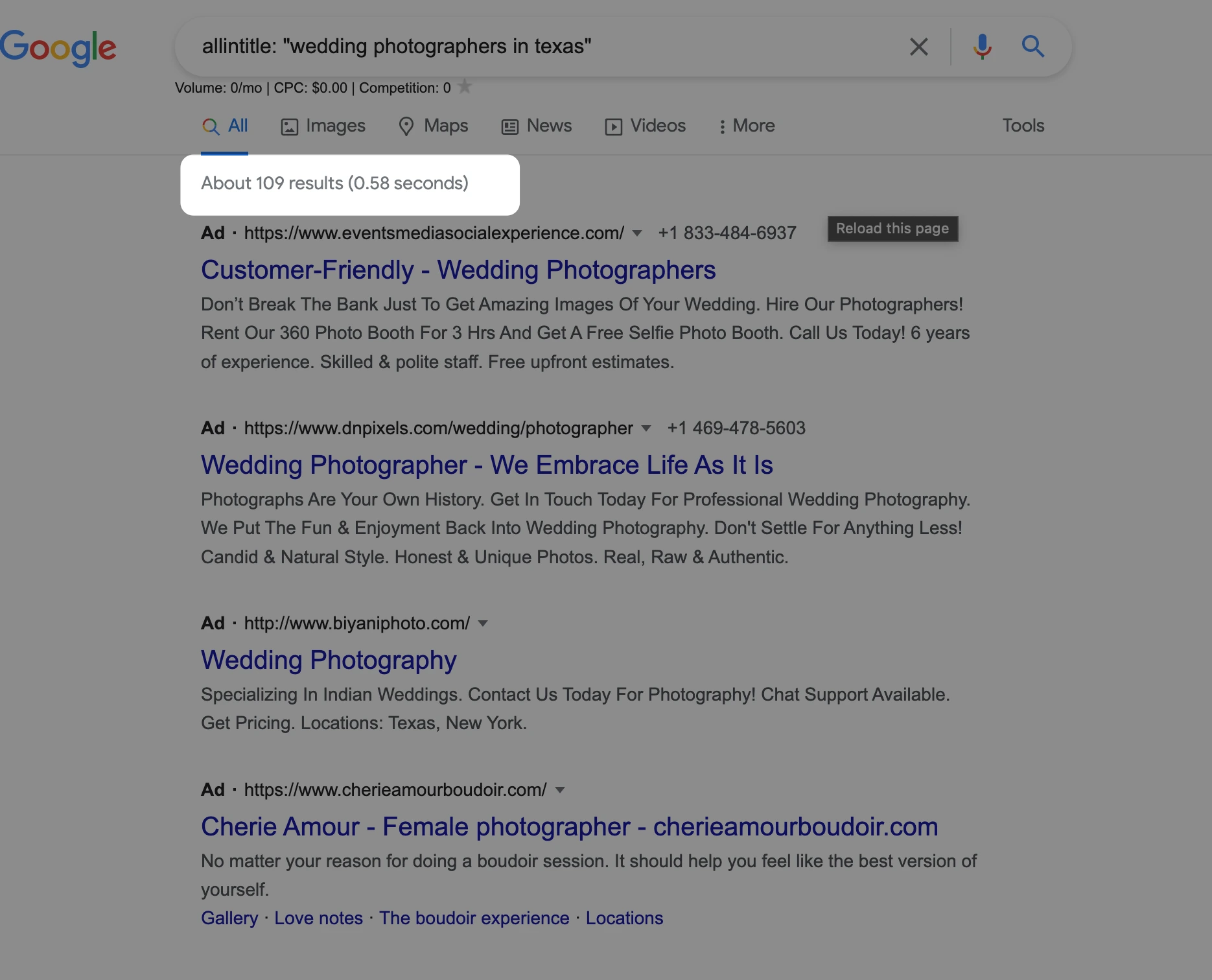
Which do you think shows you the specific number of pages with that keyword in their title tag?
The one with the quotes, you bet.
Why?
If you use the operator without the quotes, you get every indexed result that contains the words “wedding,” “photographers,” “in,” and “Texas”:

But if you conduct an allintitle search with quotes, it limits the results to only pages that have the exact term “wedding photographers in Texas” in the title:
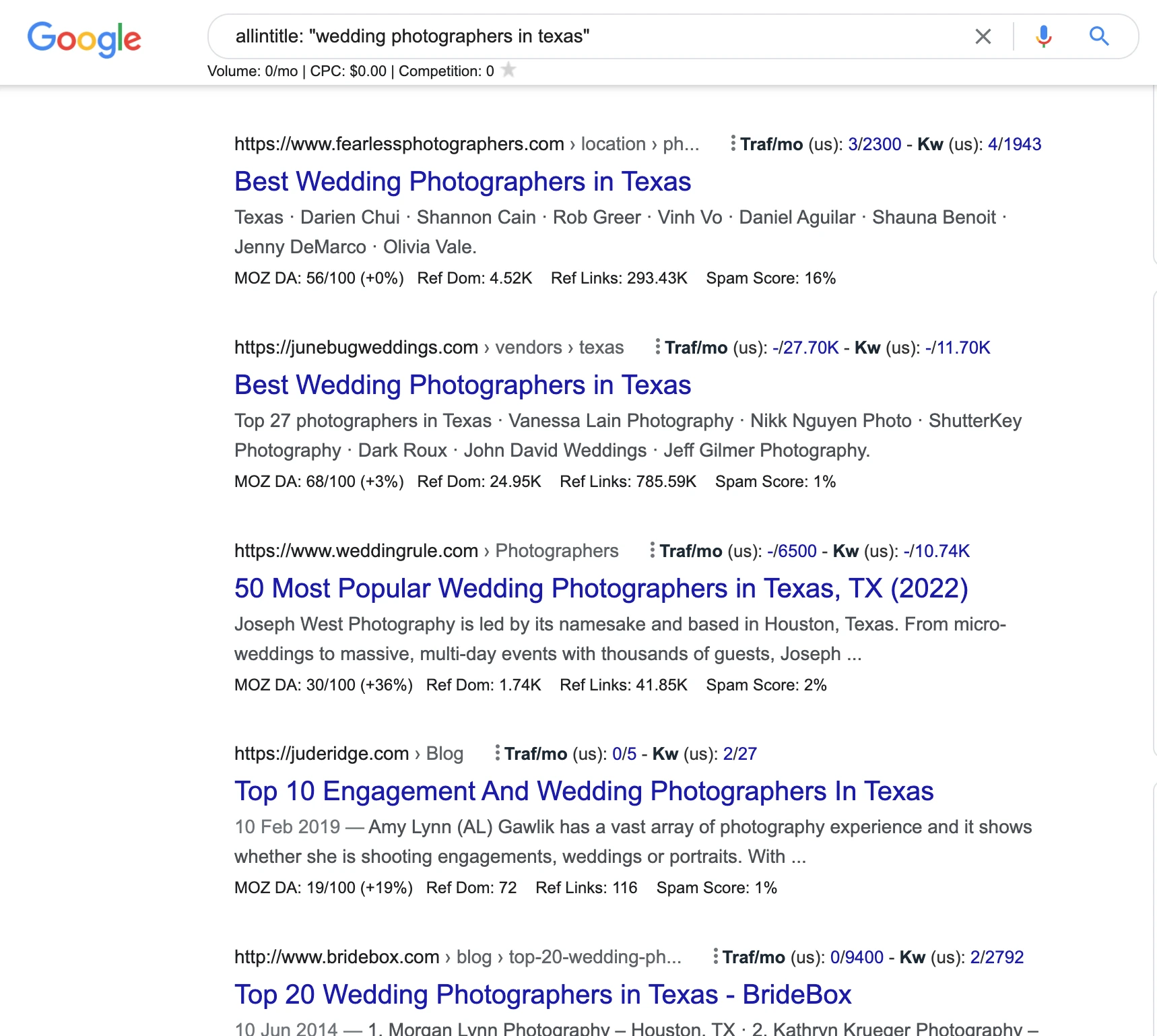
That’s why it’s always fewer than the one without quotation marks.
So, use it with quotes to narrow your searches, refine results for ambiguous searches, or exclude synonyms when searching for single terms.
Now that you know the right way to conduct allintitle keyword research, I bet you’ll like to try it out for all keywords in your content strategy.
However, if you’re like most content marketers, the keywords on your list aren’t few. There may be 1,000 or even 10,000.
How long would it take to determine each keyword’s level of competition if you ran allintitle keyword research manually with Google?
How long would you keep moving from Google to your spreadsheet before burning out?
You can skip this time-consuming process and plug your keyword into one tool that generates related keywords and the allintitle data for each.
WriterZen’s simplified content workflow is that tool.
The software kills two birds with a stone when doing allintitle keyword research: You determine keyword competition and also find fast-ranking keywords alongside their allintitle data.
This way, your keyword research workflow gets simplified. And when you craft content, they rank faster. Because you not only considered your competition but also targeted the right keywords for your SEO campaign.
Take this happy WriterZen user:
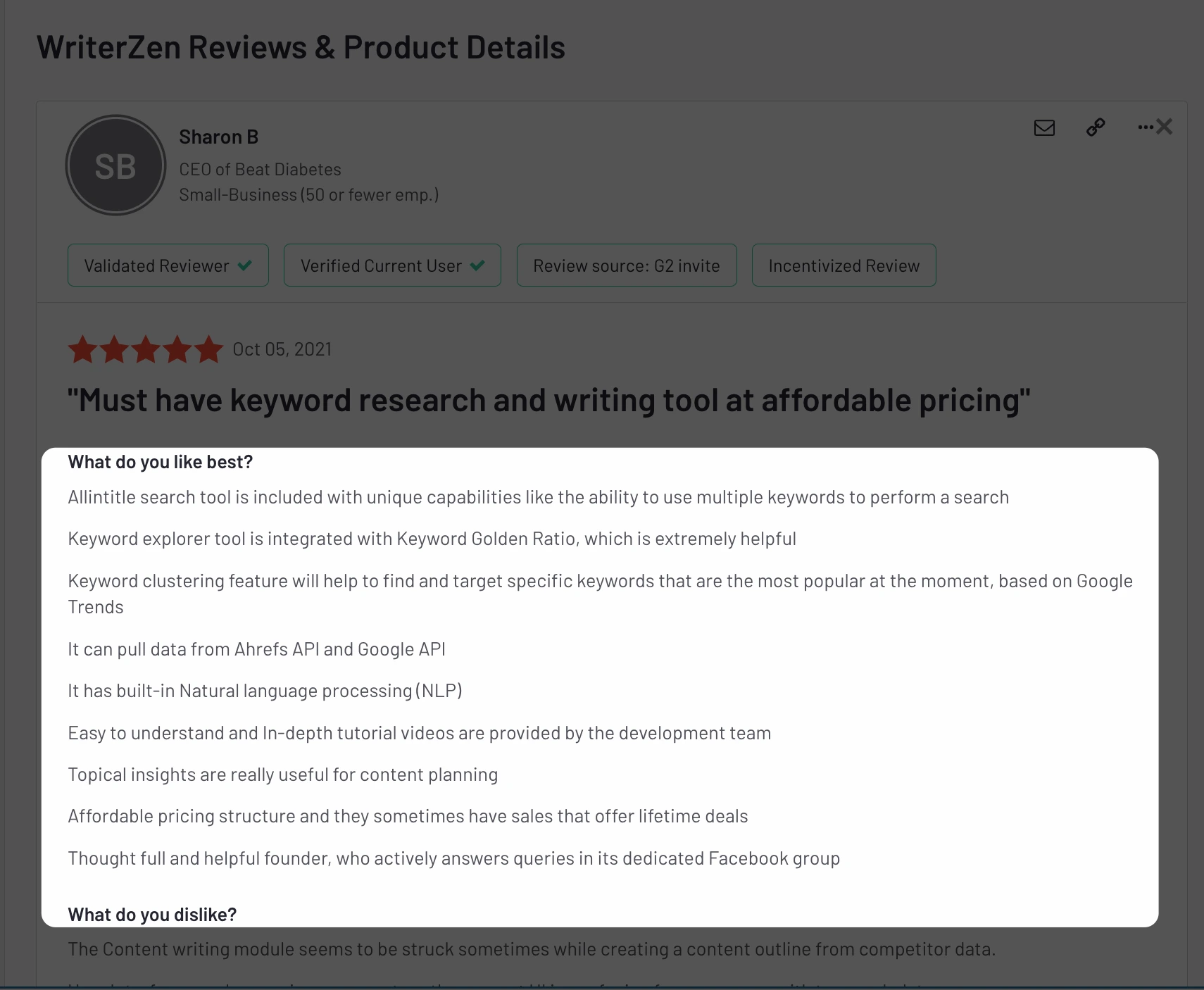
WriterZen review on G2
We’ll look at how to check allintitle with an SEO tool soon.
Before that, it’s crucial you know how Google uses allintitle to return search results, thereby giving you ideas of the competition for a specific keyword.
Allintitle and Google Search Results
When you run a quick Google search, here’s what happens.
Google fetches results related to your search phrase by bringing the most related article to the top of the list, keeping less related web pages lower.
You also find the number of search results found and the time it took:
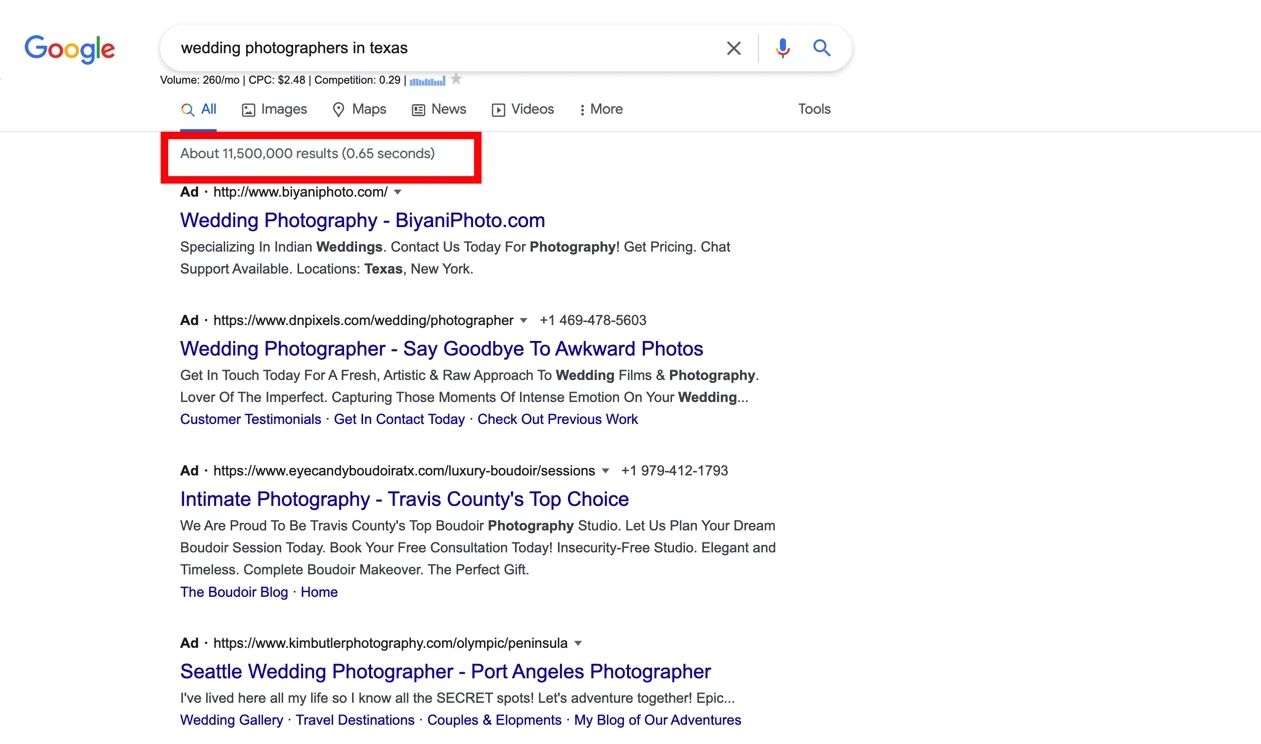
But then the number of results and the time Google spends always vary even if you run a search with the same keyword.
To illustrate, let’s enter the keyword “wedding photographers in Texas” again into the Google search box:
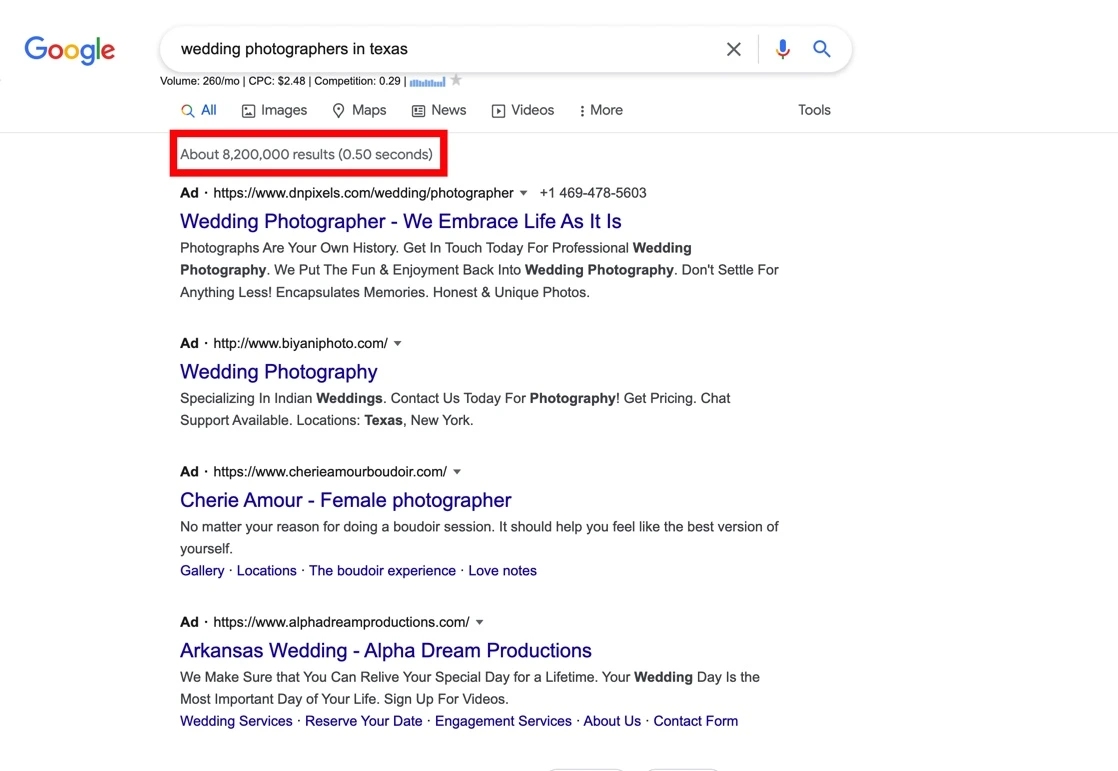
See? Different time spent and search results.
Why’s this so, you wonder?
Two reasons:
- The number of articles indexed is constantly changing and
- Google crawls billions of websites during every search.
Therefore, the number of search results depends on the number of websites live on the internet at the time of crawling. Besides that, other factors come to play.
For instance, a website’s robots.txt may be blocked, lost, or may not be actively indexed by the webmaster. Despite this, Google generates tons of search results in seconds.
However, just because it’s fast doesn’t mean it isn’t a lot of work.
As Jerod Karam, Director of Technology at Netvantage Marketing, explained:
“Google does not search the Internet when you submit a query for baseball bats. Google searches its index of the internet. This might seem trivial but it’s an important distinction because it makes the search infinitely faster.”
With the website owner’s permission, the process begins by crawling, indexing, ranking and finally ends by delivering the results to you, the user.
Google’s integrated advanced algorithms speed up the entire process. That’s why you get numerous search results within a second.
Here’s a visual representation of how a search engine crawls, fetches, and indexes data:
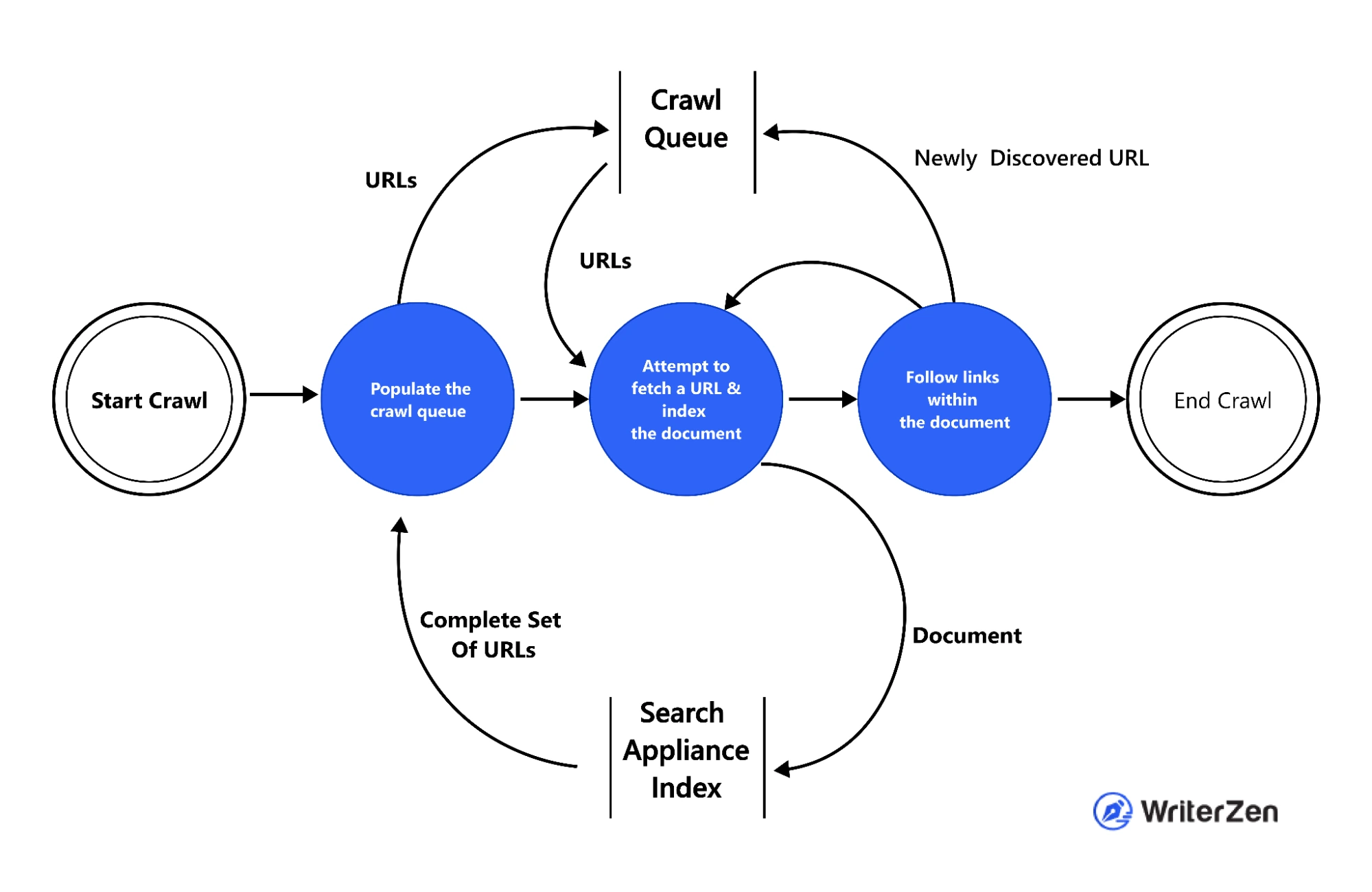
Compare the crawling process with the information retrieval model that selects and ranks the relevant documents according to a user’s query.
It follows this route:
- Crawling
- Adding to the crawl queue
- Fetching, evaluating, and indexing
- Repeating the same process with the next links
See how the data crawling process happens:
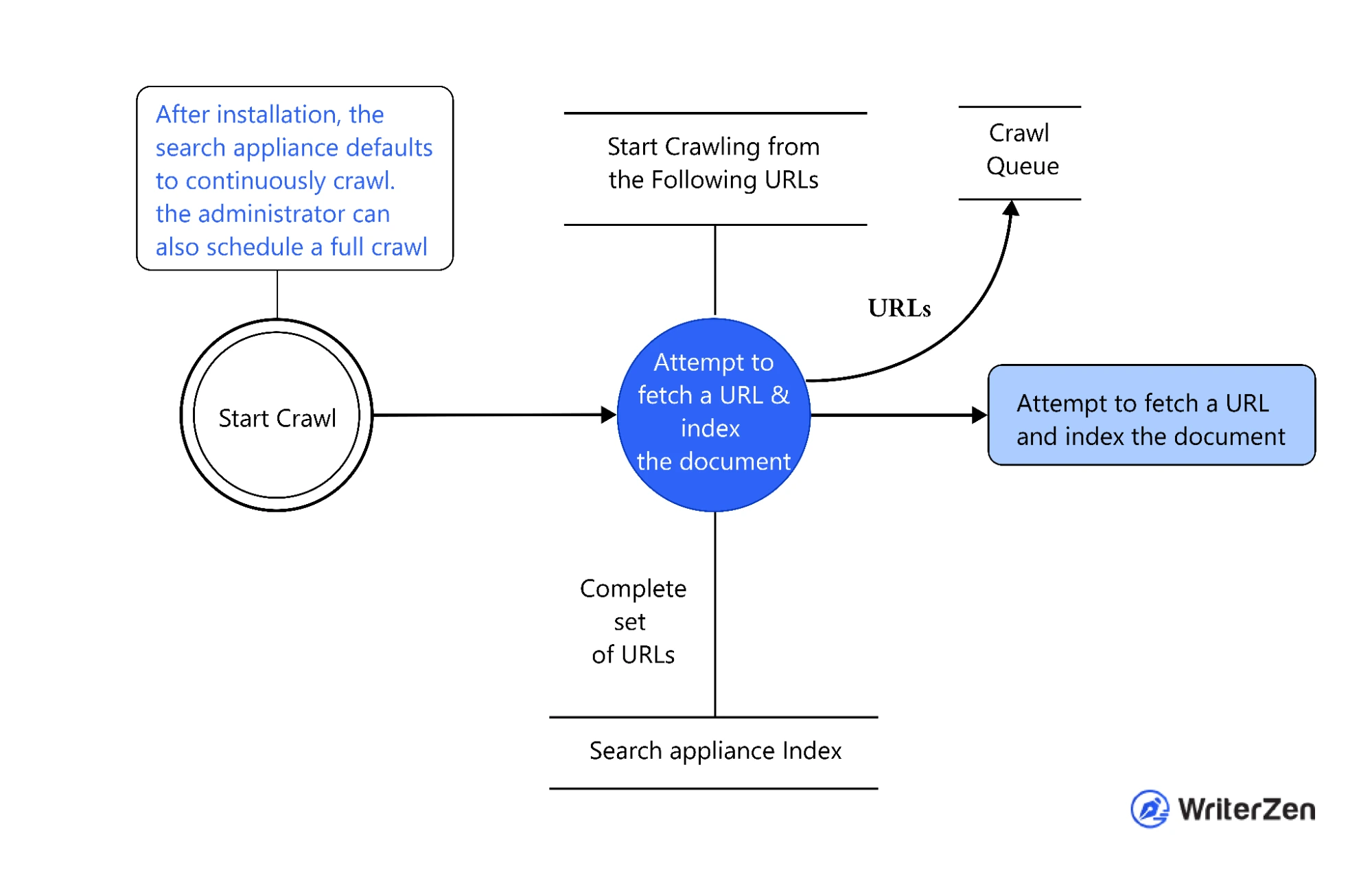
But it doesn’t stop there.
To get results in seconds, search engines also:
- Check robots.txt
- Check whether the page being crawled is a new crawl or recrawl
- Determine if it’s a continuous, scheduled, or priority crawl mode
- Carries out freshness tuning: frequently crawl, always force recrawl and recrawl these URL Patterns
- Evaluate the quality of the crawled content to decide whether to index that data or not
Furthermore, Google doesn’t evaluate just once.
Each time it recrawls, Google re-evaluates if there is an index and whether it should stay or be removed. And if it hasn’t indexed a page, it may be in the queue for Google to re-crawl if it hasn’t been disqualified from being indexed.
Google repeats this process for every search, including for allintitles.
How to Check Allintitle with an SEO Tool
To help you find keywords that have the fewest competitors, WriterZen integrated Allintitle testing in the Keyword Explorer tool.
And with it, you can run an allintitle search for up to 100,000 keywords.
You do this in two ways:
By turning on the button “Golden Filter” on the first page of Keyword Explorer:
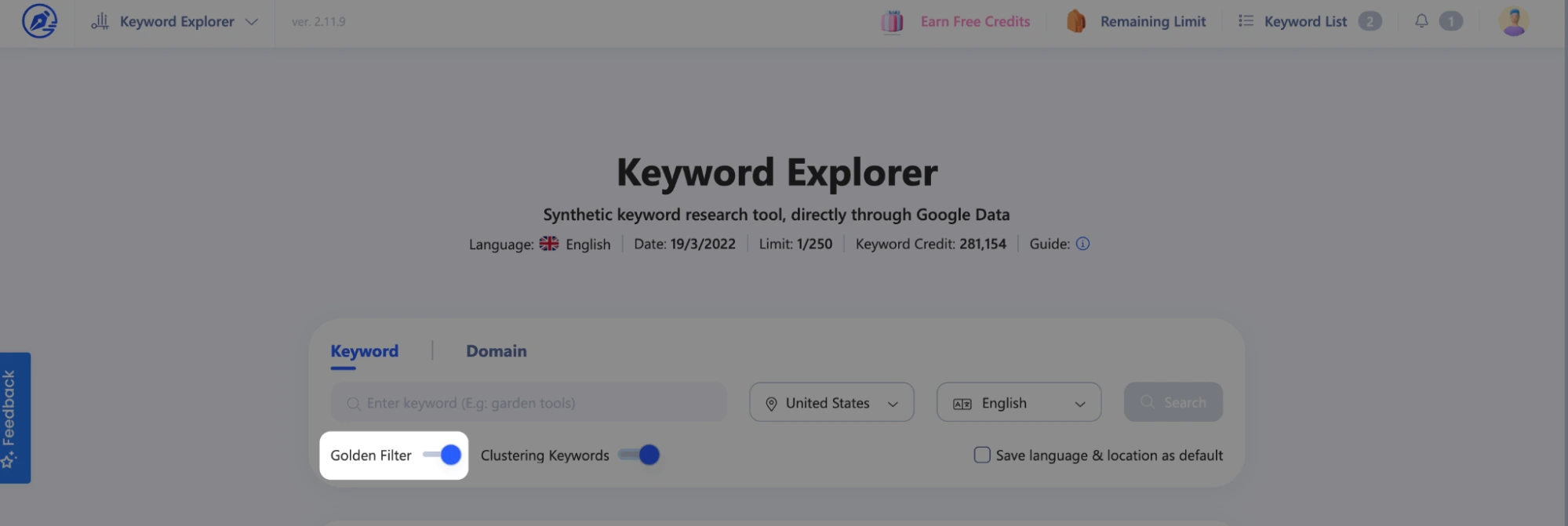
Or checking the keyword data tab and turning on the Golden Filter when your keyword results load:
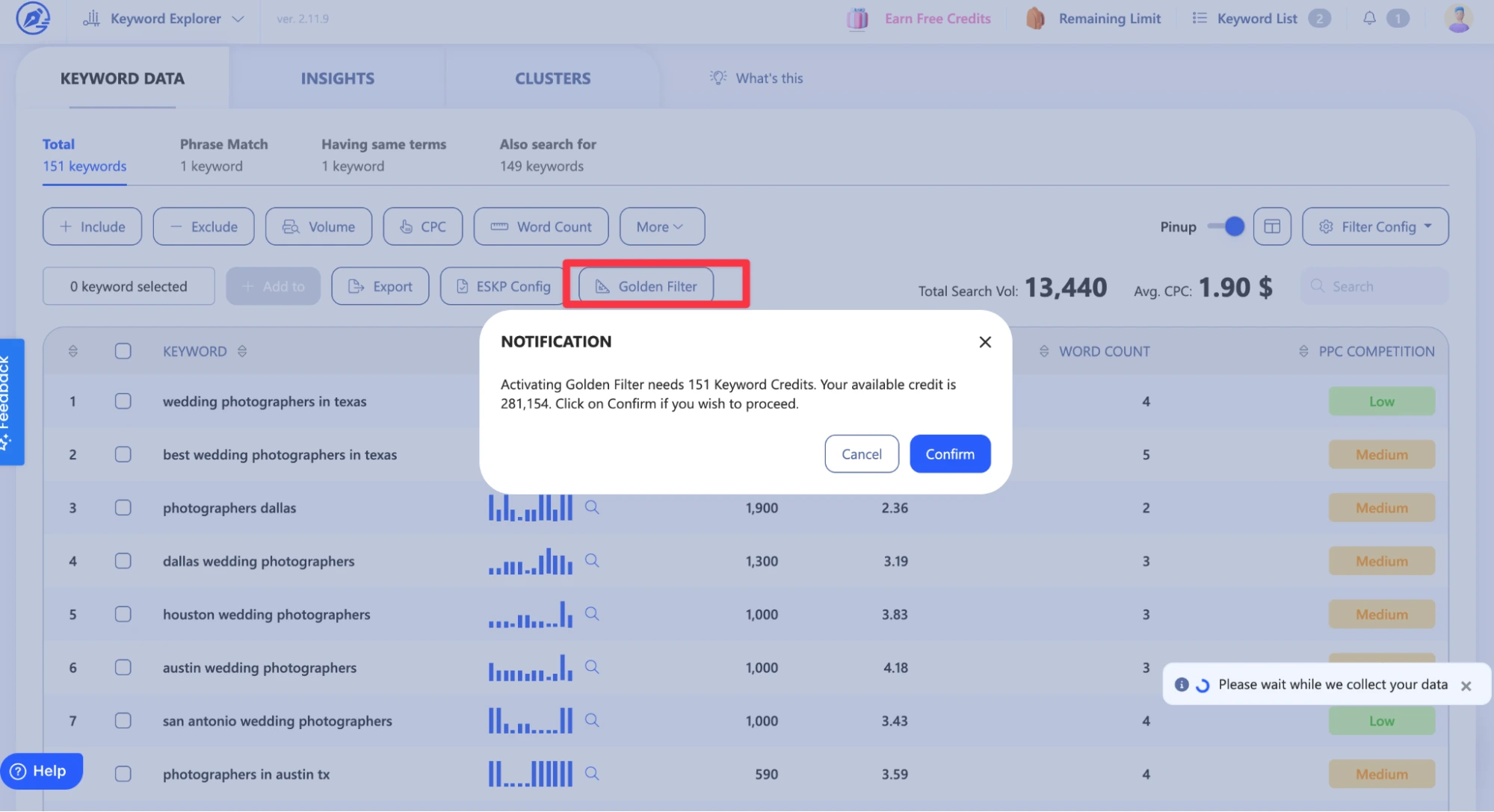
When you plug a keyword into the Keyword Explorer tool and turn on the allintitle checker, you don’t just get its allintitle.
You get the allintitle of other related keywords alongside more relevant insights.
See:
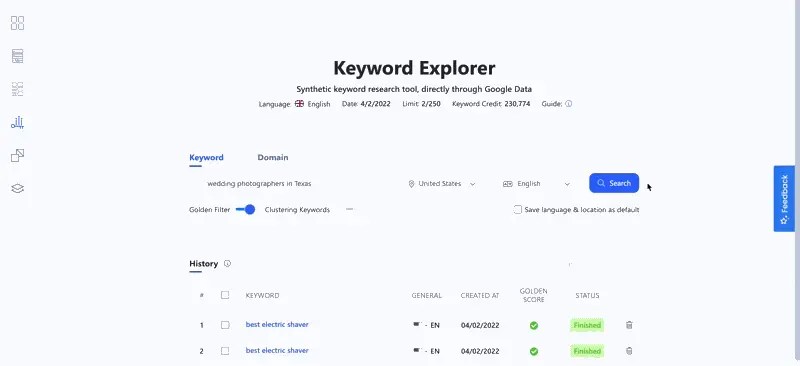
You can also adjust the allintitle filter to the least and highest numbers of competitors you want:
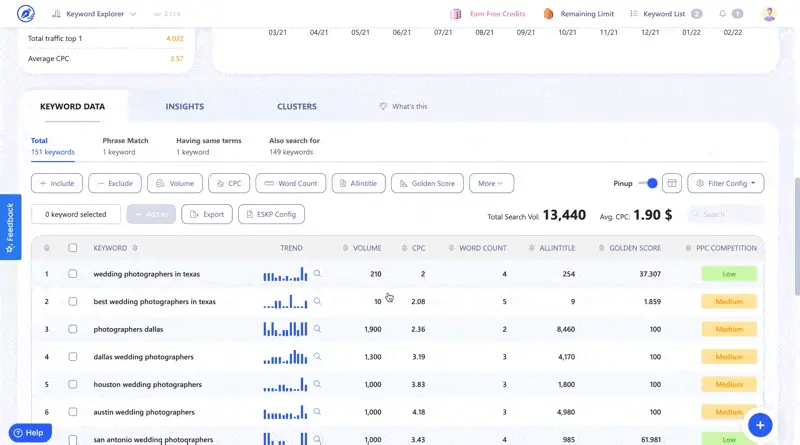
Now you may be wondering…
What exactly is this Golden Filter we had to turn on to check allintitle data?
Here’s your answer:
The Golden Filter is how you find low-competition keywords that rank in days.
It’s right beside the allintitle because the two work hand-in-hand as you can’t find low-competition keywords without knowing their level of competition.
We came up with the Golden Filter to make up for one drawback we observed about the keyword golden ratio formula:
It doesn’t cater to keywords above 250.
So, to get these fast-ranking keywords that crown your SEO efforts regardless of their search volume, use the Golden Filter in either of these two ways:
- Ranking Probability: This option lets you find high-ranking keywords to boost your organic growth if you deal with low-authority websites. And you can adjust the filter to get keywords with as low as ten allintitle and as high as 100 allintitle.
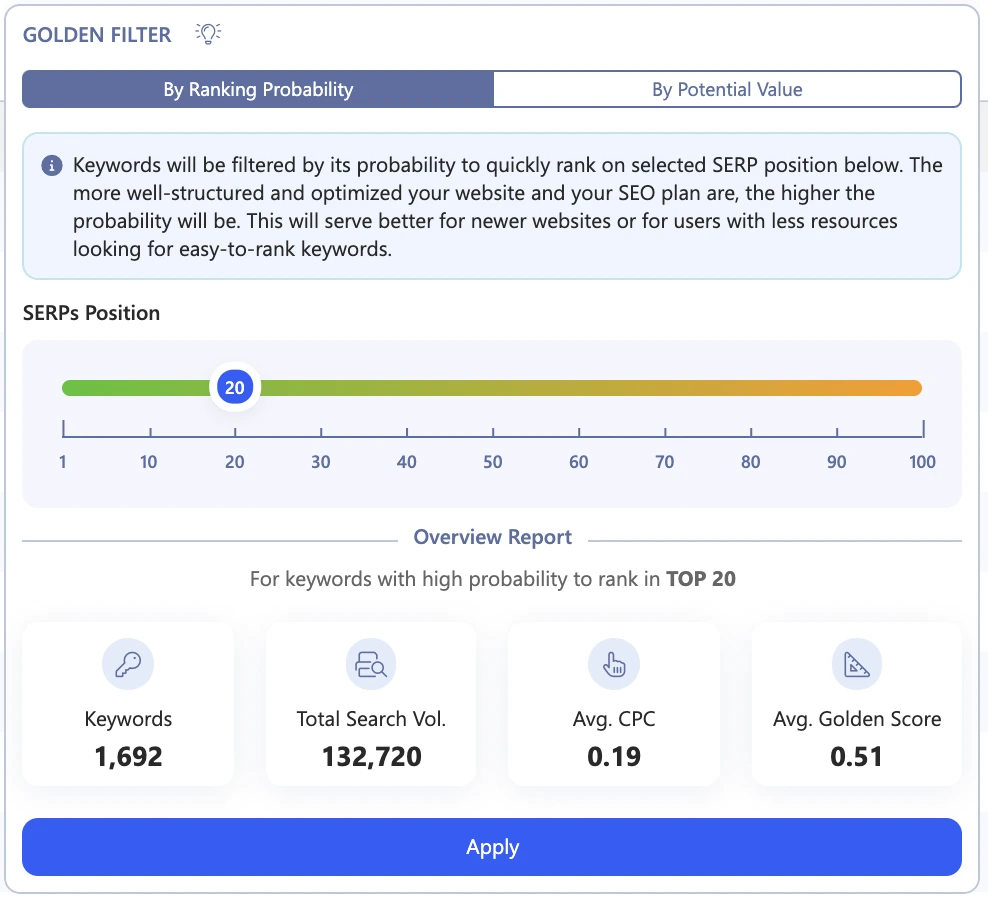
- Potential Value: This filter is suitable for high-authority websites. It helps you find both keywords with low allintitle, low search volume, and high allintitle, high search volume.
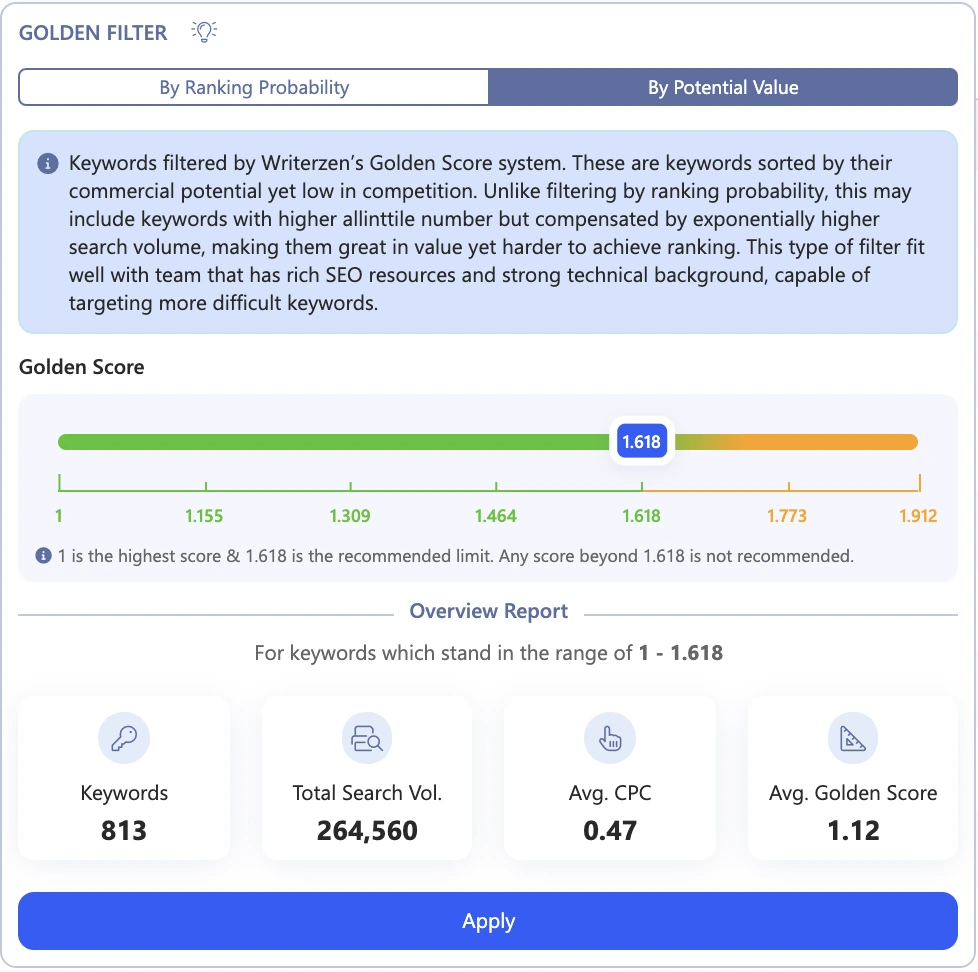
Now let’s find other fast-ranking keywords for our seed keyword:
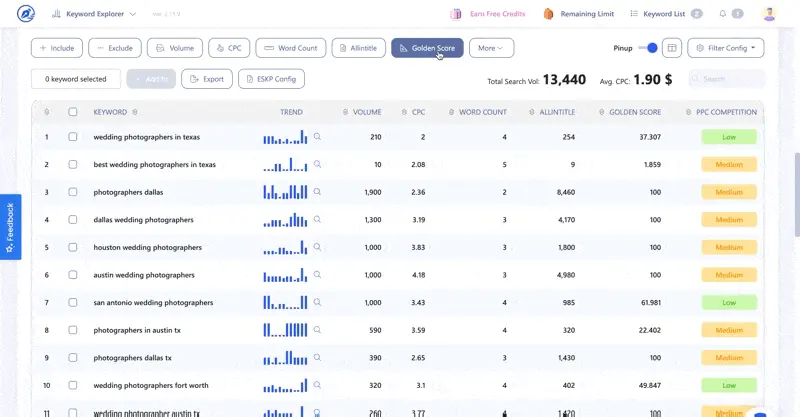
Add your chosen keywords to a list or export them once you’re done, and that will be all until it’s time to craft content.
Determine Keyword Competition at a Glance with Allintitle
In the sixth century, Sun Tzu—as you read in the introduction of this piece— never had advanced technology or artificial intelligence to spy on his enemies.
But that didn’t stop him from knowing who they were just as he knew himself.
Be the modern-day Sun Tzu as you fight the battle for organic traffic.
Know the competition for your chosen keywords by using the allintitle search operator. But don’t do it the manual way with Google search.
Speed things up with WriterZen.
Determine keyword competition and find low-competition keywords that rank fast once you craft them into high-quality content.
It’s one of many reasons users love WriterZen:
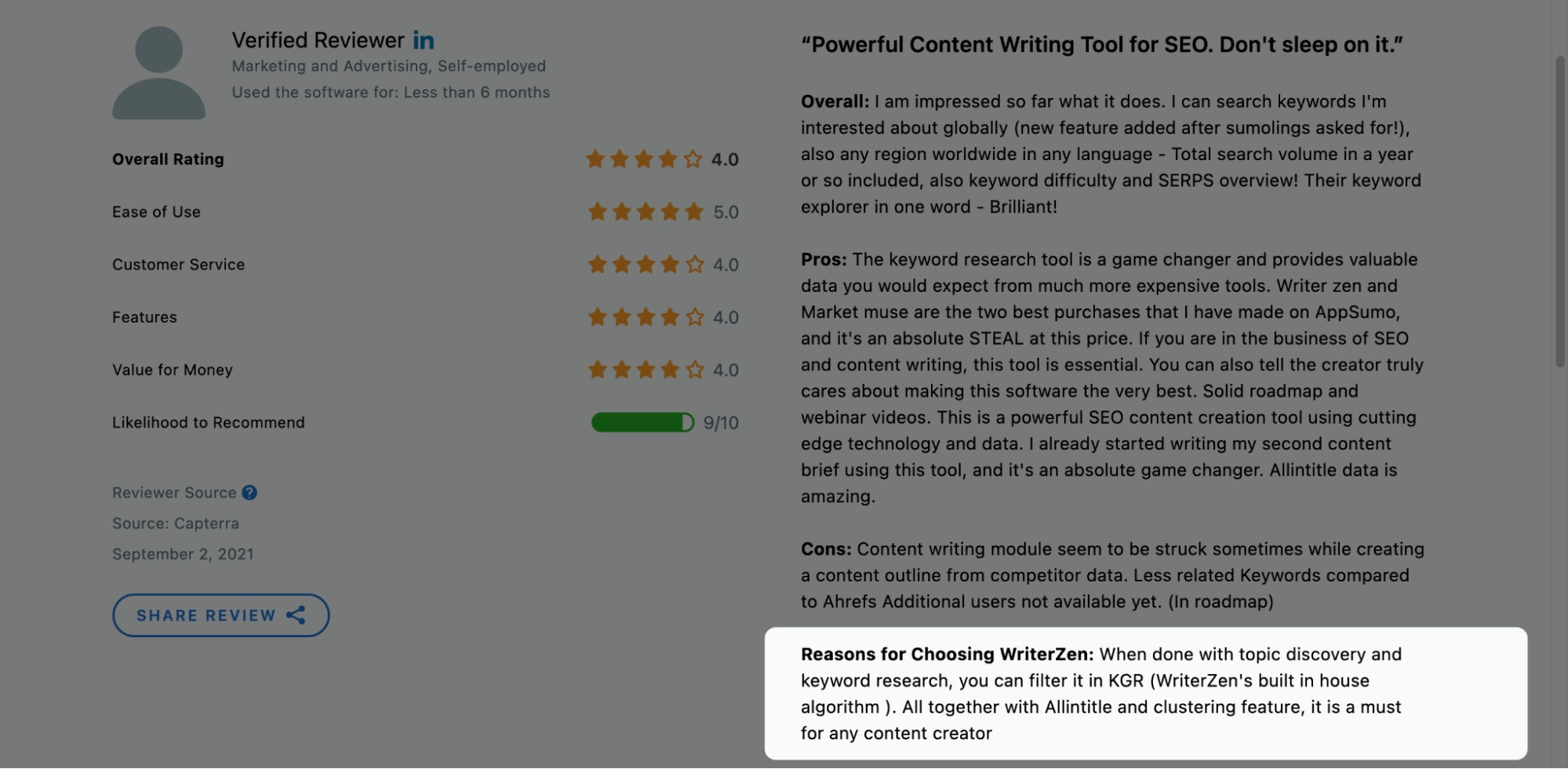
WriterZen review on Capterra

https://writerzen.net/blog/allintitle-keyword-research
#WriterZen, #allintitlekeywordresearch, #allintitlekeywordresearchWriterZen

Nhận xét
Đăng nhận xét